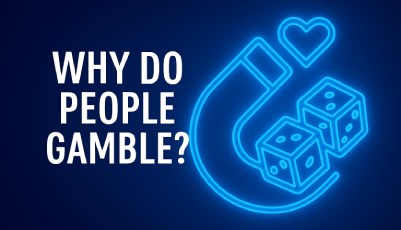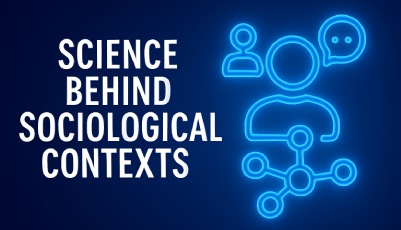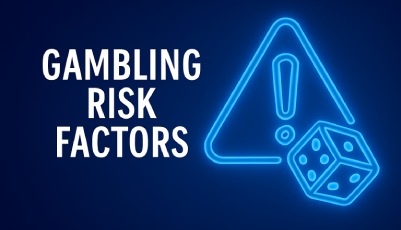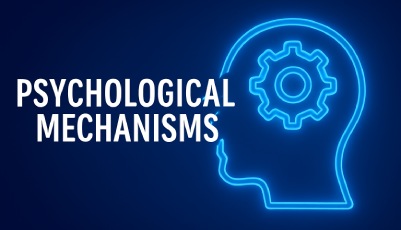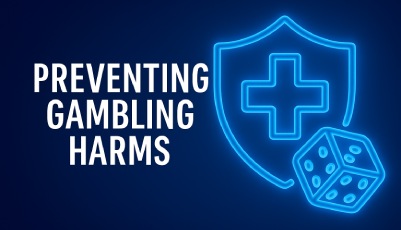The impacts of gambling ads on users has long been contentious and there have been many studies documenting the precise psychological mechanism and influences these advertisements induce into players. These influences go beyond straightforward brand marketing and recognition in what is a vast and competitive industry. The marketing campaigns have also been found to influence the way that players gamble. These include enhancing the frequency of the betting habits, lowering or distorting the perception of the risks in an individual, and even activate well studied cognitive biases in users.
We have analyzed peer reviewed case studies from different parts of the world to give a more universal perspective into the behavioral impacts of gambling ads. The studies highlight the nuanced triggers that cue unhealthy gambling habits, and play down the risks involved.
The Role of Gambling Advertising in Decision Making
A Spanish case study by García-Pérez et al. explored the connection between exposure to gambling advertisements and the betting frequency in younger gamblers. The researchers found a trend in increased betting, and impulsive gambling decisions, being made to communities who had a higher exposure to advertising campaigns. They also documented the findings on individuals based on the frequency at which they were exposed to these campaigns, and these substantiated the conclusions that higher ad frequency also cues more response from gamblers.
Another aspect of this was found in a 2022 study by McGrane et al. that examined the “priming effect” gambling ads had over users. This is the degree to which participants overestimate their ability in betting, playing down the risks and building cognitive biases. Due to the nature of sports betting and the skill based casino games, it can fuel the user’s illusion of control, and the gambling advertisements act as a catalyst to further encourage the users.
“Advertising exposure was associated with heightened perceptions of skill, even in games defined by random chance.” – McGrane et al., 2022
The studies also revealed how gambling ads could use a similar reward structure to slot machines. By inducing intermittent reinforcement, they can alter a viewers dopamine levels and leverage other psychological triggers to encourage an individual to gamble. This phenomenon, mixed with the priming effect, leads to players taking on higher risks, and betting more consistently and for longer periods than they would without the influence from the ads.
Online Sports Betting vs. Casino Marketing
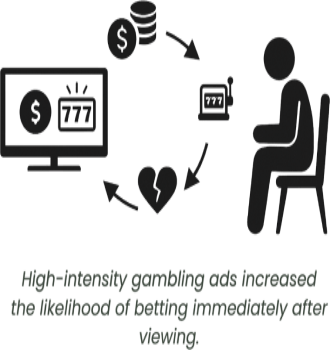
To give users a more holistic perspective of the impacts of gambling ads, we also reviewed an Australian study that documented the minutiae between sports betting and traditional casino marketing. The study, published by Heather Gridley in the Australian Psychological Society, found that while casino gambling marketing ads focused more on emotional triggers such as luxury and a feeling of escaping with games, sports betting advertisements induced more of what they called an illusion of expertise.
“Marketing that frames gambling as a test of skill can significantly alter how individuals interpret both wins and losses.” – Heather Gridley, 2013
This resonates with the Spanish case study from 2024, that also highlighted the cognitive dissonance in betting ads. This is when bettors exposed to gambling ads lose their bets, and instead of accepting it as a result of chance, they blame their betting strategy. This shifts the understanding of sports betting, like casino gaming, also an endeavor dictated by chance, and creates the illusion that sports betting can be something players can master. Casino ads, on the other hand, were found to avoid this sentiment, and they didn’t appear to mask the role of chance in the outcomes.
“Exposure to high-intensity gambling ads increased the likelihood of betting immediately after viewing, regardless of prior intent.” – García-Pérez et al., 2024
Behavioral Models Created by Gambling Ads
In the analysis of the case studies, we found two key psychological models that explained the patterns induced by gambling ads.
The cognitive bias model encourages overconfidence, and portrays gambling as a skill based endeavor that can be mastered, and ultimately controlled by the user. Presenting big wins or giving players the notion that they are close to making their own wins helps foster this illusion of control.
The other is a social learning theory, in which gambling advertisements attempt to normalize and sell gambling products as a glamorous activity. These notions can influence people of all demographics and age groups, with a special emphasis on targeting younger audiences.
The findings show that gambling marketing campaigns can actively influence the way people perceive risks, and attempt to validate it as a social norm.
Analyzing the Findings
The findings showed that the gambling ads were most potent when using known societal vulnerabilities. Impulsiveness, social validation, and a means of making money based on skill level could all prompt exposed individuals into gambling and alter any existing gambling habits.
We found that the studies underscore the importance of limiting the volume of gambling ads, and how they should be regulated to include more educational messages for players.
FAQs
Research suggests a correlation between frequent gambling ad exposure and increased risky gambling behaviors, especially among young adults, though causation requires more longitudinal data (Nyemcsok et al., 2024).
Ads often frame gambling as a skill-based activity, reinforcing the illusion of control, a cognitive bias where people believe their decisions influence purely random outcomes.
Not necessarily, but they exploit different biases. Sports betting ads often foster overconfidence in skill, while casino ads lean on emotional and impulsive triggers.
Limiting ad frequency and banning content that depicts gambling as a lifestyle or guaranteed win can reduce the activation of harmful cognitive biases.
References
The impact of gambling advertising and marketing on online gambling behavior Á. García-Pérez, A. Krotter, G. Aonso-Diego (2024)
What is the evidence that advertising policies could have an impact on gambling-related harms? E. McGrane, H. Wardle, M. Clowes, L. Blank, R. Pryce, M. Field, C. Sharpe, E. Goyder (2022)
The increasing harm from advertising and promotion of gambling in sport Heather Gridley (2013)
